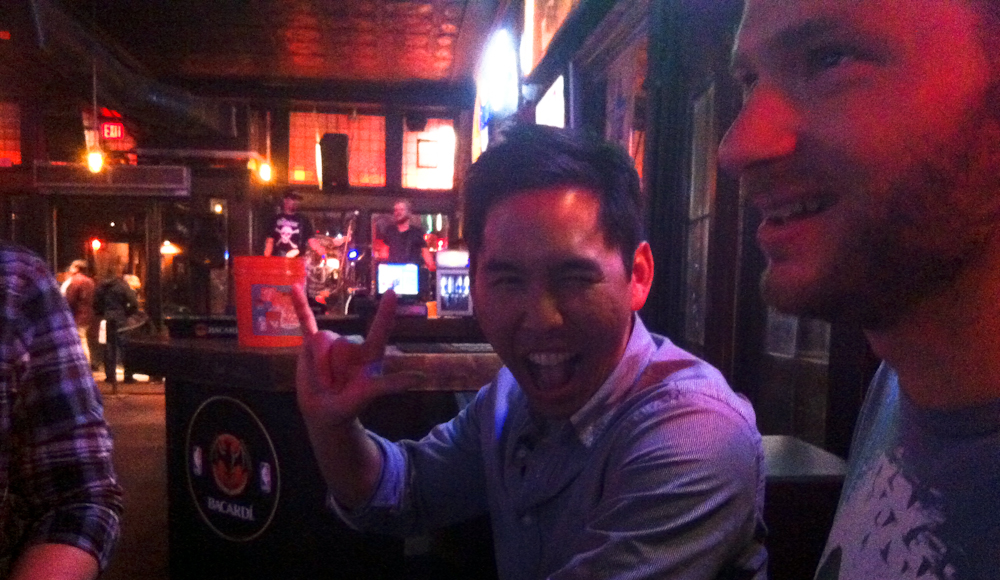"My name is Darth Vader. I am an extraterrestrial from the planet Vulcan!" - Back to the Future
A few weeks ago, my friends and I were wandering through 6th Street in Austin, Texas when we heard a band covering Nirvana's "Smells Like Teen Spirit" in a nearby bar. "They sound perfect, like Kurt Cobain reincarnated or something" my buddy said. The group was called Nothing Left Austin. They didn't just sing some of the best music from the 90s, they became the bands they were covering, both in sound and style. We stayed at that bar until the end of the set list and went to all of their shows that weekend.
Nothing Left transported me back to my adolescence. Listening to them reminded me of what it was like to discover Green Day's Dookie for the first time, being totally fascinated by the music video for The Smashing Pumpkins's "Tonight Tonight", and all the times I played Radiohead's "Creep" when I thought I was a loser. I felt younger, more invigorated, less inhibited. It was like time travel.
I wanted to see if others had experienced anything like this. So I did what any good psychologist would do—consult the scientific literature. Here's what I learned about the psychology of music.
1) Syncing us together.
Listening to Nothing Left Austin brought me closer to my friends.
We still don't know what advantage the ability to hear pitch, rhythm, and timbre gives us as a species. But I really like the conclusions of Aniruddh D. Patel's research on the neuropsychology of music. Patel studied how humans and animals synchronize with musical beats through head bobbing, foot tapping, and dancing. It turns out not only is this an incredibly complex process which integrates auditory, vocal, visual, and movement regions of the brain, but it's also very rare—besides humans, some birds, whales, dolphins, and seals, no other animal on the planet can sync to music. According to Patel, music helps us connect with each other:
“Somehow moving in time with other people to a common beat blurs the line between self and other and makes you more likely to be cooperative or pro-socially oriented toward the person outside of a musical context.”
This was definitely my experience listening to Nothing Left. I remember all of us singing along to Foo Fighter's "Learn to Fly". I felt closer to my friends, other random folks dancing along, and the band itself.
2) Working like language.
No Doubt crams a lot of expression into their music.
One of Patel's first experiments concluded
that the brain responds to music similar to how it hears spoken language. Both
language and music use sounds to help us be social, so some similarity in brain
functioning makes sense. Music also has a major role in helping us to remember and
teach information (e.g. the alphabet song), just like language.
Five-time Grammy winner Victor Wooten summarizes this nicely in his TED ED video below.
Wooten states:
"[Music] serves the same purpose [as language]. It's a form of expression. A way for me to express myself, convey feelings, and sometimes it actually works better than a written or verbal language."
A great example of this is "Don't Speak" by No Doubt. Lead singer Gwen Stefani wrote the song shortly after a breakup with her ex-boyfriend (and band mate). The music quickly communicates the shock, sadness, and anger of being dumped better than language alone.
3) Changing how we feel.
My gym playlist always gets me psyched for my workouts.
The human brain really likes music. When we listen to our favorite songs, the brain releases dopamine (the neurotransmitter linked to reward and pleasure) right before our favorite parts (e.g. 1 minute and 50 seconds into Oasis's "Wonderwall"). This is rare—the release of dopamine is primarily reserved for important things related to our survival (like food and sex).
Music is also linked to specific emotions. We've all experienced this. Every time I hear Jewel's "Foolish Games" I get a crushing feeling of isolation and anger while The Rembrandts' "I'll Be There For You" just puts a smile on my face. Daniel Levitin believes “[music] is a regulating force for our moods” and can be used to energize us in the morning, relax us at night, and give us a kick in the butt when we need extra motivation. The same is true of violent music, which increases our aggressive thoughts and feelings.
4) Taking us back in time.
Watching Third Eye Blind in 2000, my first big concert.
Important music from our lives can take us back in time by activating key memories, especially if they're strong emotional memories. Whenever I hear Third Eye Blind's "Semi-Charmed Life" I vividly remember the excitement and anxiety I had the summer before starting high school. Music often makes us feel nostalgia. Listening to Nothing Left, I remembered what it was like to be a teenager, both the freedom from responsibilities and the excitement about an unwritten future.
5) Part of our identities.
Karaoke is one way I express my passion for music.
Music
is a big part of who we are. The type of music we like matches our personalities.
Our musical taste
becomes another form of expression, just like our clothes and hairstyles.
My favorite type of music is reflective and personal. It's not just stuff from my adolescence like Collective Soul or Pearl Jam. I'm drawn to classics like Johnny Cash, The Beatles, Bob Dylan, and Fleetwood Mac for the same reason I love indie rock bands like Arcade Fire, Death Cab for Cutie, and The Decemberists—each tell great stories about incredibly emotional experiences.
How has music impacted your life? Have you ever had a moving experience at a concert? Do you use music to change how you feel?







